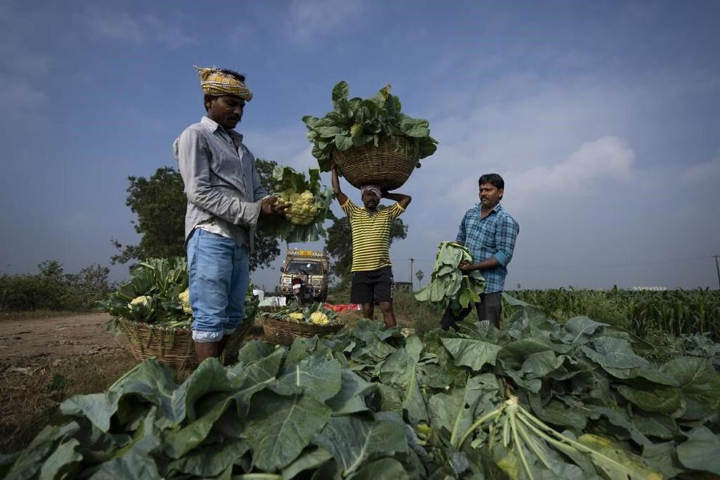
Farm workers pack freshly harvested cauliflowers at a farm in Pedavuppudu village, Guntur district of southern India's Andhra Pradesh state, Monday, Feb. 12, 2024. (AP Photo/Altaf Qadri)
In Guntur, India, farmers are adopting natural farming methods to counter the effects of increasingly erratic and severe weather patterns linked to human-induced climate change. Ratna Raju, a farmer in Andhra Pradesh, has implemented a unique approach on his farm to protect his crops from adverse weather conditions.
Raju employs a mixture of cow urine, jaggery (unrefined sugar), and other organic materials on his farm, which serves multiple purposes. This concoction acts as both fertilizer and pesticide while also providing a barrier against extreme weather events such as cyclones and heatwaves. By applying these natural substances to his crops, including corn, rice, and leafy greens, Raju aims to fortify them against the harsh environmental conditions prevalent in the region.
Andhra Pradesh has emerged as a model for natural farming practices, with government support playing a crucial role in promoting these methods. The success of natural farming in the state has led to calls for its expansion across India, particularly in light of ongoing farmers' protests and the challenges posed by climate change.
The benefits of natural farming were evident during Cyclone Michaung in December, which caused widespread damage to crops in Andhra Pradesh. While traditional farms suffered extensive losses due to flooding, Raju's natural farm managed to absorb the excess rainfall effectively, mitigating damage to his crops. The porous soil resulting from natural farming practices allowed rainwater to seep into the ground quickly, preventing waterlogging and ensuring the health of the crops.
The positive outcomes observed on Raju's farm have prompted neighboring farmers like Srikanth Kanapala to consider transitioning to natural farming methods. Kanapala, whose fields were inundated during the cyclone, incurred significant financial losses as a result. Witnessing the resilience of Raju's crops has convinced him of the potential benefits of adopting organic practices.
Government initiatives in Andhra Pradesh have facilitated the transition to natural farming, with hundreds of thousands of farmers embracing these methods. However, widespread adoption of natural farming across India remains a challenge, as many farmers continue to rely on chemical pesticides and fertilizers.
Meerabi Chunduru, a proponent of natural farming, emphasizes the need for greater government support and subsidies to encourage more farmers to make the switch. Concerns about the health impacts of chemical pesticides further underscore the importance of promoting organic agriculture.
Despite the potential benefits of natural farming, skepticism persists among political leaders, government officials, and scientists. The lack of national standards and guidelines, as well as limited access to markets for organic produce, pose significant barriers to the widespread adoption of natural farming practices.
However, advocates argue that investing in natural farming can yield long-term benefits for both farmers and the environment. By prioritizing sustainable agriculture, India can improve soil health, enhance food security, and mitigate the impacts of climate change on agricultural productivity.















